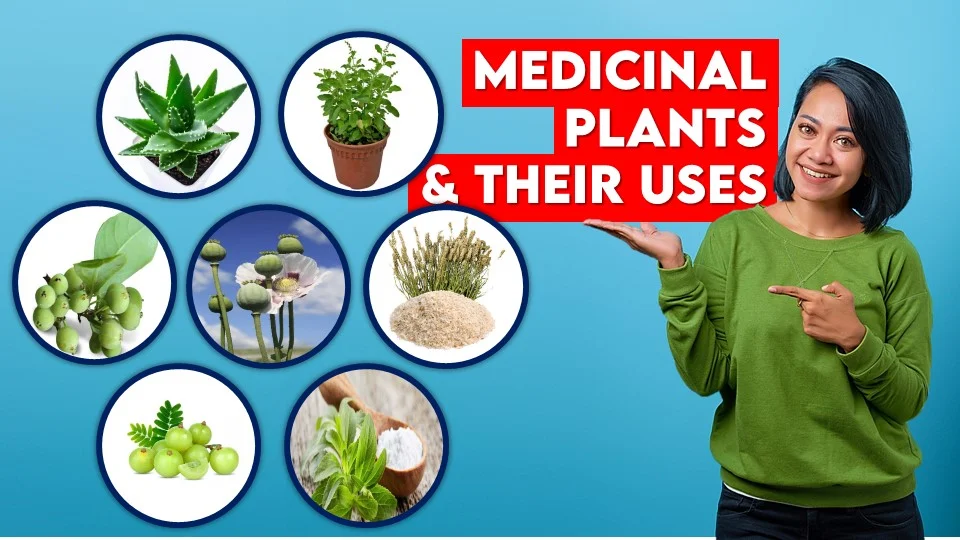Discover 10 Essential Medicinal Plants
Introduction
Nature has always been a source of healing and wellness, offering numerous remedies for various ailments. Among the myriad of natural cures, medicinal plants hold a special place. These plants have been used for centuries across different cultures for their healing properties. In this article, we will explore some Essential Medicinal Plants that have stood the test of time and continue to be invaluable in promoting health and well-being.
- The Healing Power of Nature
The healing power of nature is undeniable. Throughout history, people have turned to plants for their medicinal properties to treat illnesses and maintain health. Essential Medicinal Plants like Aloe Vera, Lavender, and Echinacea are just a few examples of how nature provides potent solutions for our health needs. These plants offer natural, holistic remedies that are often free from the side effects associated with synthetic medications.
- Why Medicinal Plants Matter
Medicinal plants matter because they offer a natural alternative to pharmaceuticals. They are often more affordable and accessible, especially in regions where modern medicine is not readily available. Essential Medicinal Plants can be grown in home gardens, making them a convenient option for many. Additionally, using plants for medicinal purposes can reduce the dependency on chemical-based drugs, promoting a healthier lifestyle and a more sustainable environment.
Aloe Vera
- Soothing Skin and Digestive Health
Aloe Vera is one of the most well-known Essential Medicinal Plants, celebrated for its soothing properties. Its gel is commonly used to treat burns, cuts, and skin irritations. But the benefits of Aloe Vera go beyond skin care. It also aids in digestion, helping to soothe the digestive tract and alleviate issues like acid reflux and constipation.
- Traditional and Modern Uses
Traditionally, Aloe Vera has been used in various cultures for its healing properties. Ancient Egyptians called it the “plant of immortality” and used it in their beauty routines. Today, it is a staple in many skincare products and health supplements. The versatility of Aloe Vera makes it a valuable addition to the list of Essential Medicinal Plants.
Lavender
- Calming Nerves and Improving Sleep
Lavender is another star among Essential Medicinal Plants, primarily known for its calming effects. The soothing aroma of lavender can help reduce anxiety and promote better sleep. It’s often used in aromatherapy, essential oils, and even teas to help people relax and unwind.
- Therapeutic Benefits and Applications
Beyond its calming effects, lavender has antiseptic and anti-inflammatory properties. It can be used to treat minor burns and insect bites and to improve skin health. The therapeutic benefits of lavender make it a versatile plant, with applications ranging from beauty products to medicinal remedies. Including lavender in your collection of Essential Medicinal Plants can enhance both physical and mental well-being.
Echinacea
- Boosting the Immune System
Echinacea is an especially strong herb that is often used to strengthen immunity. It’s often taken as a supplement to prevent colds and flu. The active compounds in Echinacea enhance the immune system, making it more effective at fighting off infections.
- Historical and Current Use
Historically, Echinacea was used by Native Americans to treat various ailments, from wounds to infections. Today, it remains a popular remedy, especially during cold and flu season. Its effectiveness in boosting immunity makes Echinacea a critical part of the Essential Medicinal Plants repertoire. Consistent use of Echinacea can lead to fewer illnesses and a stronger overall immune response.
Chamomile
- Aiding Digestion and Reducing Anxiety
Chamomile is widely known for its calming effects, making it a popular choice for reducing anxiety and promoting relaxation. But its benefits don’t stop there. Chamomile also aids in digestion, helping to soothe the stomach and relieve conditions like indigestion and gas.
- Everyday Uses and Health Benefits
Chamomile can be consumed as a tea or applied topically in various forms. The everyday uses and health benefits of chamomile make it an essential part of any collection of medicinal plants. Incorporating chamomile into your daily routine can help maintain a balanced and healthy lifestyle, showcasing the invaluable nature of Essential Medicinal Plants.
By understanding and utilizing these Essential Medicinal Plants, we can tap into nature’s pharmacy and enjoy the myriad of health benefits they offer. From soothing skin to boosting the immune system, these plants provide natural and effective remedies for common ailments.
Peppermint
- Relieving Headaches and Muscle Pain
Peppermint is one of the most popular Essential Medicinal Plants known for its soothing properties. Its high menthol content makes it particularly effective in relieving headaches and muscle pain. Applying peppermint oil to the temples can help alleviate tension headaches, while a peppermint-infused balm can soothe sore muscles. The cooling sensation provided by menthol acts as a natural pain reliever, making peppermint a go-to remedy for these common ailments.
- Medicinal and Culinary Uses
Beyond its medicinal uses, peppermint is also valued in the culinary world. Its fresh, minty flavor adds a delightful taste to beverages, desserts, and savory dishes. In addition to its culinary versatility, peppermint aids in digestion and can relieve symptoms of irritable bowel syndrome (IBS). Drinking peppermint tea or incorporating the herb into meals can support digestive health. As one of the Essential Medicinal Plants, peppermint offers a perfect blend of therapeutic and culinary benefits, making it a staple in both medicine cabinets and kitchens.
Ginger
Easing Nausea and Inflammation
Ginger has been revered for centuries for its powerful anti-nausea and anti-inflammatory properties. This root is particularly effective in easing nausea caused by motion sickness, morning sickness during pregnancy, or chemotherapy. Consuming ginger tea or chewing on a piece of raw ginger can provide quick relief. Additionally, ginger’s anti-inflammatory compounds, such as gingerol, help reduce inflammation and pain in conditions like arthritis, making it an indispensable member of the Essential Medicinal Plants family.
- Ancient Remedy and Modern Science
Ginger’s medicinal use dates back to ancient civilizations, where it was commonly used in traditional medicine systems like Ayurveda and Traditional Chinese Medicine. Modern science has corroborated many of these traditional uses, validating ginger’s effectiveness in treating various ailments. Research studies have shown that ginger can significantly reduce symptoms of osteoarthritis and improve digestive health. Its wide range of applications, supported by both ancient wisdom and modern research, highlights ginger’s role as a key player among Essential Medicinal Plants.
Turmeric
- Anti-Inflammatory and Antioxidant Properties
Turmeric, a bright yellow spice, is renowned for its powerful anti-inflammatory and antioxidant properties. The active compound in turmeric, curcumin, has been extensively studied for its health benefits. Curcumin helps reduce inflammation in the body, which can alleviate symptoms of chronic inflammatory diseases like rheumatoid arthritis. Additionally, its antioxidant properties protect cells from damage caused by free radicals, contributing to overall health and wellness.
- Traditional and Contemporary Uses
Traditionally, turmeric has been used in Ayurvedic and Traditional Chinese Medicine to treat a variety of conditions, including digestive disorders and skin diseases. Today, it is widely used in both culinary and medicinal contexts. Turmeric supplements are popular for their potential to reduce inflammation and support joint health. Including turmeric in your diet, whether in curries, teas, or supplements, can offer numerous health benefits. This versatile spice stands out as one of the most effective Essential Medicinal Plants for combating inflammation and oxidative stress.
Garlic
- Heart Health and Antimicrobial Effects
Garlic is a potent herb known for its heart-healthy and antimicrobial properties. Consuming garlic regularly can help lower blood pressure, reduce cholesterol levels, and improve overall cardiovascular health. Its active compound, allicin, has strong antimicrobial effects, making garlic effective against various bacteria, viruses, and fungi. These properties make garlic an invaluable addition to the list of Essential Medicinal Plants.
- From Ancient Remedies to Modern Medicine
Garlic has been used as a medicinal plant for thousands of years. Ancient civilizations, including the Egyptians and Greeks, recognized its health benefits and used it to treat infections and heart conditions. Modern medicine continues to validate these uses, with numerous studies confirming garlic’s cardiovascular and antimicrobial benefits. Whether consumed raw, cooked, or in supplement form, garlic remains a powerful tool in natural medicine. Its enduring popularity and proven efficacy highlight its importance among Essential Medicinal Plants.
Ginseng
- Enhancing Energy and Mental Clarity
Ginseng is a well-known adaptogen that helps enhance energy levels and improve mental clarity. Often used to combat fatigue and increase stamina, ginseng is particularly beneficial for those dealing with chronic stress or exhaustion. It also supports cognitive function, helping to boost memory and focus. Including ginseng in your routine can lead to increased vitality and sharper mental acuity.
- Cultural Significance and Medicinal Uses
Ginseng holds significant cultural importance, especially in Asian countries where it has been used for centuries in traditional medicine. It is often regarded as a tonic for overall health and longevity. Modern research supports many of these traditional uses, showing that ginseng can enhance physical performance, boost the immune system, and reduce stress. Its diverse range of health benefits and cultural significance underscore its value as an Essential Medicinal Plant.
Rosemary
- Cognitive Boost and Pain Relief
Rosemary is a fragrant herb known for its ability to boost cognitive function and relieve pain. The aroma of rosemary has been shown to enhance memory and concentration, making it a popular choice for improving mental performance. Additionally, rosemary’s anti-inflammatory properties can help alleviate pain, particularly in conditions like arthritis and muscle soreness.
- Aromatic and Health Benefits
The aromatic benefits of rosemary extend beyond cognitive enhancement. It is also used in aromatherapy to reduce stress and promote relaxation. When used topically, rosemary oil can improve circulation and provide relief from joint and muscle pain. Its versatility and range of applications make rosemary a valuable addition to the list of Essential Medicinal Plants. Incorporating rosemary into your daily routine, whether in cooking, aromatherapy, or topical applications, can offer numerous health benefits.
Conclusion
- Recap of Key Benefits
Essential Medicinal Plants like peppermint, ginger, turmeric, garlic, ginseng, and rosemary offer a wide array of health benefits. From relieving headaches and muscle pain to enhancing energy and cognitive function, these plants provide natural and effective remedies for common ailments. Their therapeutic properties are supported by both traditional wisdom and modern science, highlighting their enduring importance in natural medicine.
FAQs
Q. What are the top 10 essential medicinal plants?
Ans. The top 10 essential medicinal plants include aloe vera, chamomile, lavender, peppermint, echinacea, ginseng, turmeric, ginger, garlic, and elderberry. These plants are known for their healing properties and are commonly used in herbal medicine.
Q. How can I use medicinal plants at home?
Ans. You can use medicinal plants at home by making teas, tinctures, or infusions. For example, chamomile can be brewed as a tea for relaxation, while ginger can be added to recipes for its digestive benefits. Always consult a healthcare professional before using new herbs.
Q. Are there any side effects of using medicinal plants?
Ans. While medicinal plants offer many benefits, they can also have side effects. For instance, some plants may cause allergic reactions or interact with medications. It’s important to use them responsibly and seek advice from a healthcare provider.
Q. Where can I find these medicinal plants?
Ans. You can find medicinal plants at health food stores, herbal shops, or online. Some plants, like aloe vera and lavender, can also be grown at home in gardens or pots.
Q. Can children and pregnant women use medicinal plants?
Ans. Children and pregnant women should be cautious when using medicinal plants. Some herbs may not be safe for them, so it’s best to consult a healthcare professional before use.














Post Comment